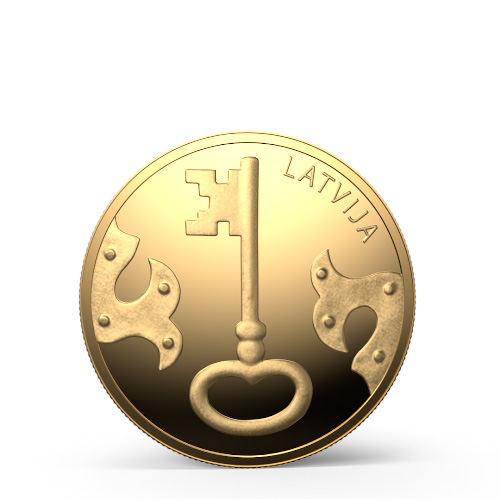
E-mail: coins@bank.lv
Cashier's Office in Riga
Address: Bezdelīgu 3, Rīga
Phone: +371 67022722
 Kolekcijas
KolekcijasSelect your language


Obverse
A key is featured vertically in the centre of the coin, with hope chest fittings depicted to the right and left from it; inscription LATVIJA is semi-circled to the right along the upper edge of the obverse.
Reverse
A lock of a hope chest is featured in the centre of the coin, with the year 2021 semi-circled along the middle part of the edge to the left and inscription 5 EURO in the lower part to the right.
Edge
Reeded.
Specifications
Face value: 5 euro
Weight: 1.24 g
Diameter: 13.92 mm
Metal: 999.9° gold
Quality: proof
Maximum mintage: 2 000
Struck in 2021 by Koninklijke Nederlandse Munt (The Netherlands))
Artists Graphic design: Laimonis Šēnbergs
Plaster model: Ligita Franckeviča
A key bears a special, one may even say, a slightly mystical symbolic meaning. Why? It has the ability both to unlock and to lock: to open the door to a particular room, grant access to riches or to deny these opportunities. A key has the power that elevates it above all the other objects in the world.
In the family of the ancient Roman gods, Janus was the god of doors and gates. As the time passed, Janus was worshiped as the god of all beginnings (actions): the dawn was devoted to him, and the first month of the year (Januarius) was named after Janus. Statues of Janus, opposite-facing profiles of the same image, were placed near all significant entrances, e.g. to shrines or fortifications.
In Japan, the key is seen as a sign of luck as it symbolically opens the doors to hidden treasures of the soul.
In artworks related to Christianity, two keys reflect St. Peter's power to open the gates of paradise and hell. There are two keys also on the coat of arms of the Pope.
In the Medieval period, the ritual of handing over the keys played a symbolic role: it was a complete takeover of power.
In fairy tales and stories, the key often symbolises a variety of obstacles that need to be overcome in order to solve a secret.
In Latvian folk wisdom, a key is associated with both pleasures and troubles: "Who finds the key, will have the luck", "If you blow in the keyhole, the devil will come home", "Putting the keys on the table will bring conflicts to your home"...
Latvian cultural heritage, the lock and the fittings of a hope chest, beautifully crafted by ancient artisans, served as the artistic inspiration for the small gold coin "The Key". In the past, the hope chest was an important part of wedding rituals: it was taken to the husband's home in a horse-drawn cart, and the appearance of the hope chest sent a message about the daughter family's wealth.
In the past, the hope chest was an important part of wedding rituals: it was taken to the husband's home in a horse-drawn cart, and the appearance of the hope chest sent a message about the daughter family's wealth.
